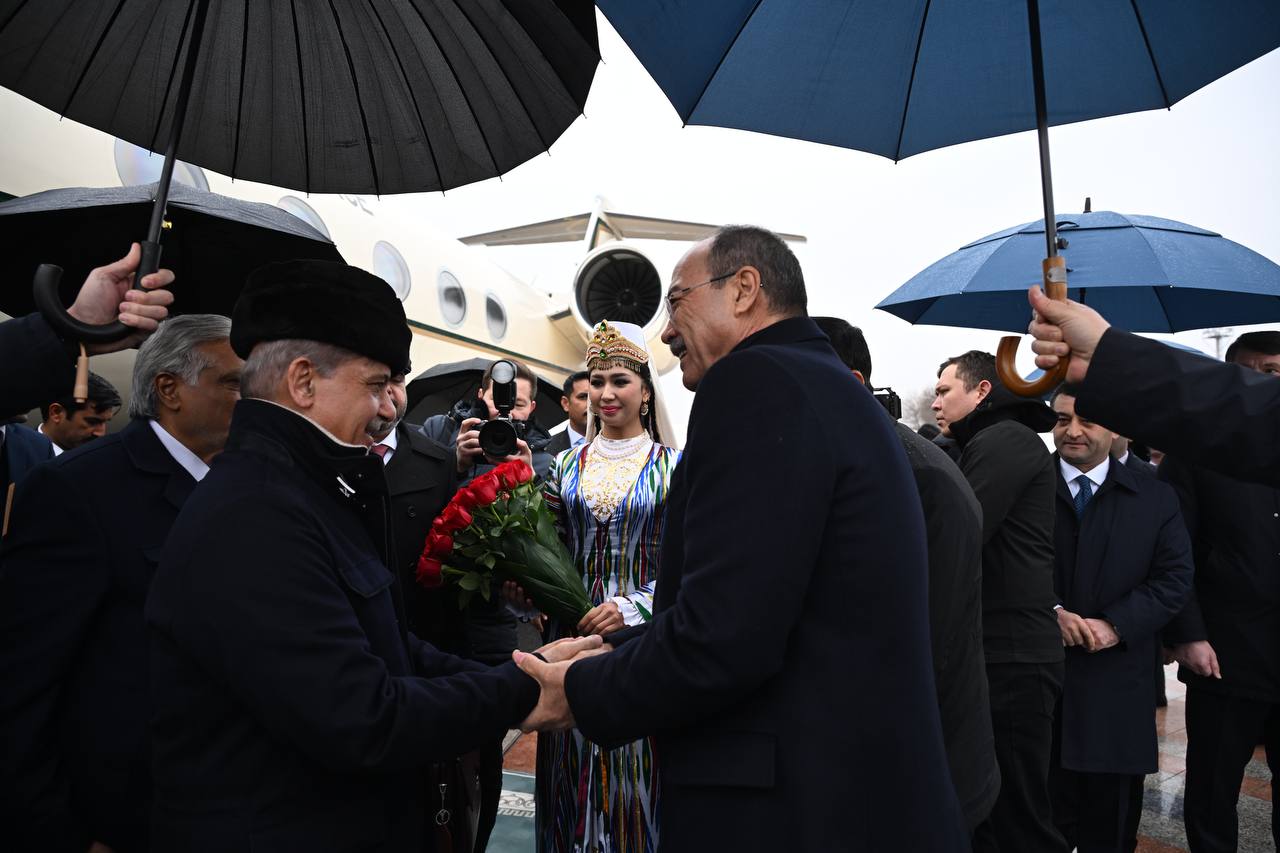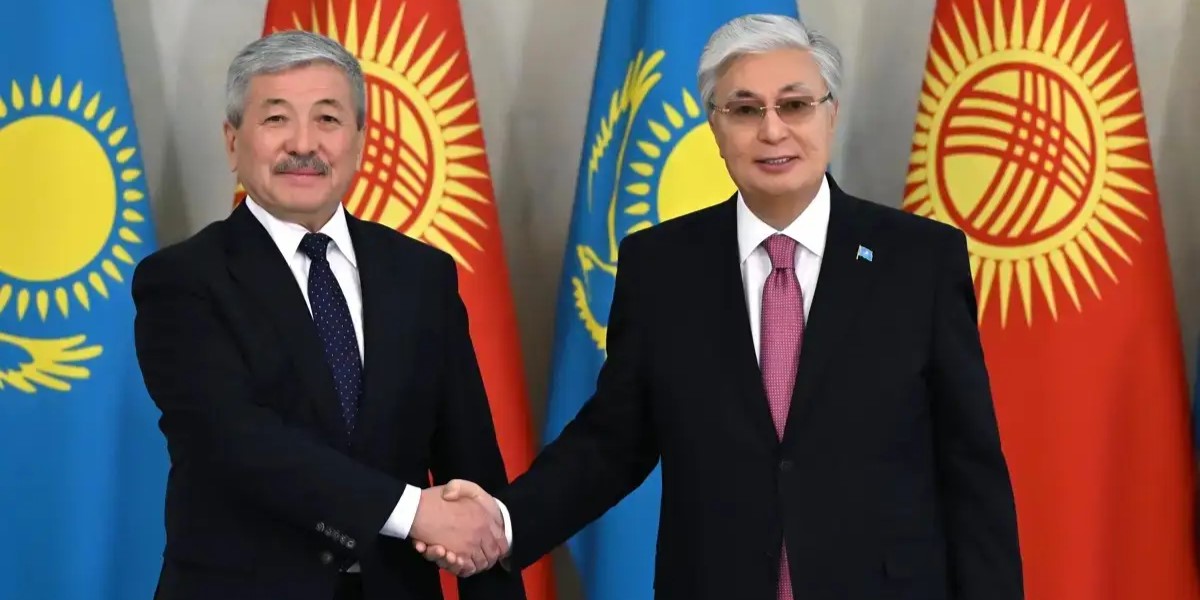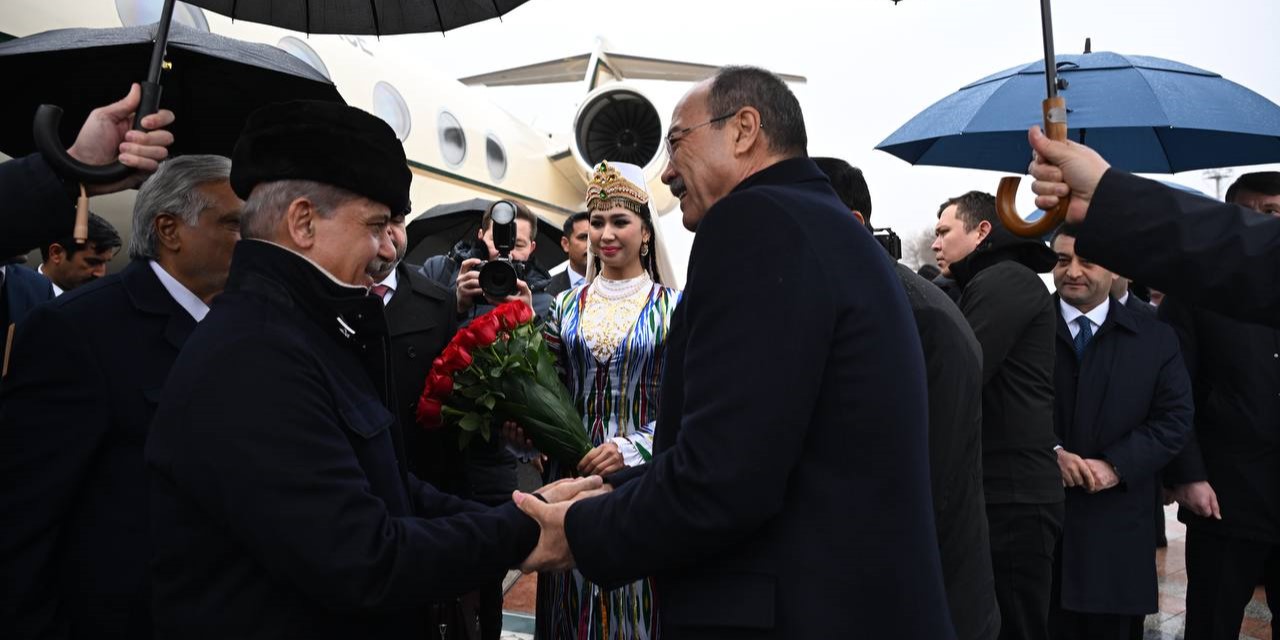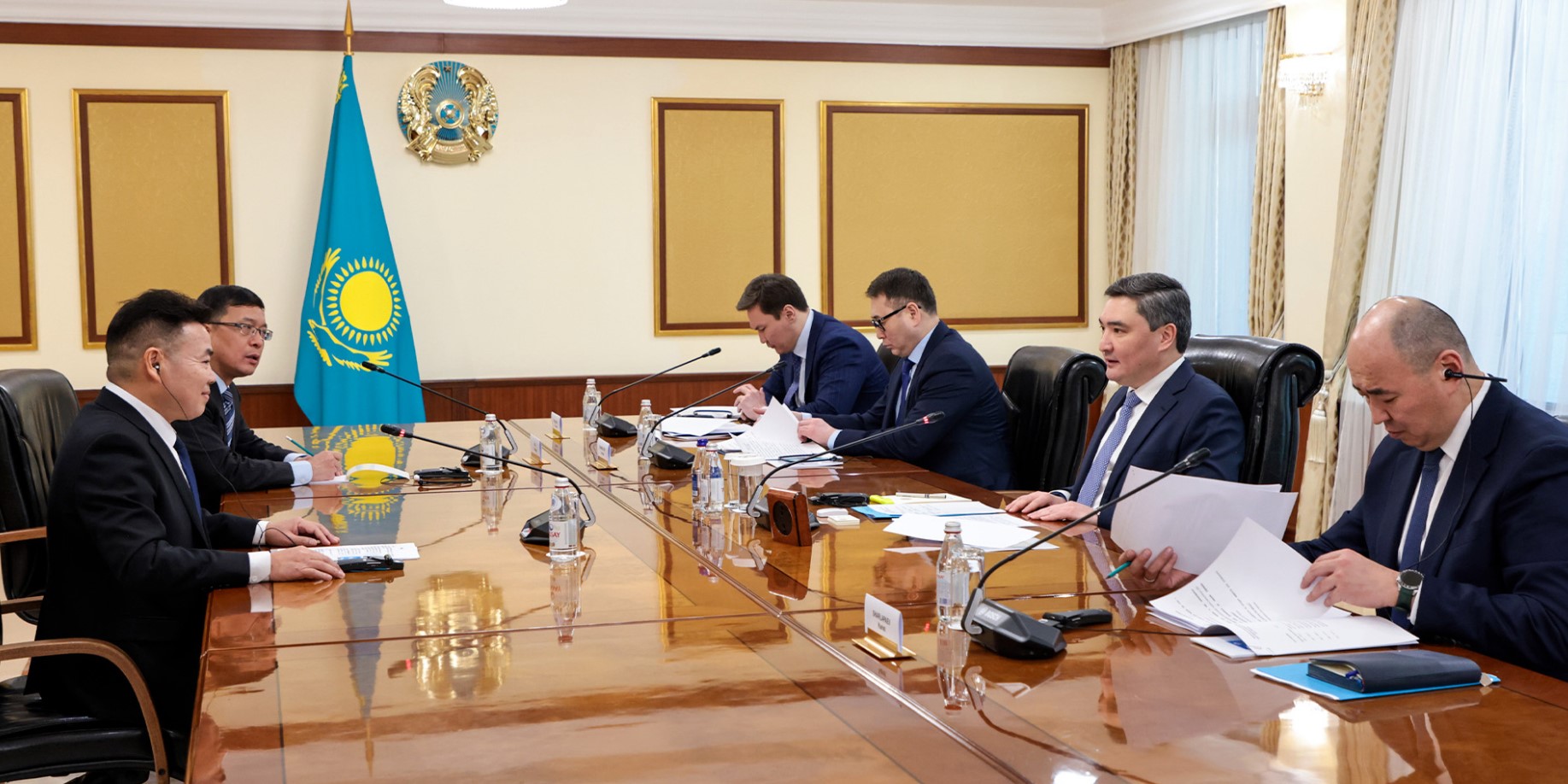This week, the media in the region covered several critical diplomatic events, including the Kyrgyzstani Prime Minister’s visit to Astana, the Pakistani Prime Minister’s visit to Tashkent, and new details from the Kyrgyzstani-Tajikistani border agreement. They also reported on numerous energy stories, including Kazakhstan confirming where it will build its first nuclear power plant, electricity demand rising by 4% across Central Asia last year, and Kazakhstan halting all exports of petroleum products. Several outlets have noted Kazakhstan's plans to build a new $1.2 billion steel plant and Tajikistan's signing of a contract with a Chinese company to construct the longest bridge in Central Asia. Multiple sources also covered the new EU sanctions package that targeted two Kazakhstani companies.

Pakistan’s Prime Minister Shehbaz Sharif paid an official visit to Tashkent. Source: Kun.uz
Diplomatic Events
Kyrgyzstani Prime Minister, Adylbek Kasymaliev, paid his first official visit to Kazakhstan this week (Akchabar). He met with his Kazakhstani counterpart, Olzhas Bektenov, to discuss implementing previous agreements and possible future areas of cooperation. Prime Minister Bektenov noted that trade turnover between both countries reached $1.7 billion and that they aim to increase this beyond $2 billion in the coming years (Kazinform). Following the Prime Minister’s meeting, Kazakhstani Transport Minister Marat Karabayev revealed that the Besagash and Sortobe border checkpoints would be modernised and expanded (Kazinform). He announced that construction work on the new Aksu-Kamyshanovka checkpoint would begin next year. Prime Minister Kasymaliev also met with Kazakhstani President Kassym-Jomart Tokayev to explore further expanding their collaboration in the energy, trade, and cultural sectors (Kazinform). President Tokayev highlighted the need to expedite the construction of industrial and logistics complexes on the border. While in Astana, Prime Minister Kasymaliev visited Kazakhstan’s National Space Centre and the government’s digitalisation office (Akchabar). During the visit, both sides signed an agreement to build small hydroelectric power plants (HPP) in Kyrgyzstan (Kursiv). The deal is part of a broader effort to boost green energy production and strengthen economic ties. Currently, 55% of Kazakhstan’s electricity comes from coal-fired power plants, while 28% is generated from natural gas and 9.1% from hydropower.

Kyrgyzstani Prime Minister Adylbek Kasymaliev visited Astana this week. Source: Kazinform
Last week, we reported that Kyrgyzstan and Tajikistan had signed a historic border agreement. This week, new details from the agreement came to light as the agreement was presented to the Kyrgyzstani parliament (AKIpress). Addressing the parliament, the head of the State Committee for the National Security of Kyrgyzstan, Kamchybek Tashiyev, spoke about several aspects of the agreement, including the road to Vorukh, a Tajikistani exclave in Kyrgyzstan (Asia Plus). The road, which is 3,425 meters long and 40 meters wide, would be neutral but would be constructed by the Tajikistani side. Meanwhile, Kyrgyzstan would construct a 3,241-meter long road to Samarkandek. While he did not refer to a particular road, he was likely referring to the bypass road around the Kyrgyzstani village of Kapchygay (Tangi). The issue of the Vorukh road has been a flashpoint for clashes between both sides. In 2021, both countries signed Protocol No. 39 and agreed to build an independent road to Vorukh to bypass the Kyrgyzstani village. However, negotiations subsequently broke down. In addition, he stated that another flashpoint, the Golovnoi water facility, had been divided equally between both parties, with each side gaining control over one and a half sluices (Asia Plus). However, he did not provide any details regarding water distribution and only noted that “There are agreements on how the water should be divided.” Kyrgyzstan also acquired 750 hectares across the Munzhu-Bulak area in the Chon-Alay district (500 hectares), Karoool-Don area (100 hectares), and Katta-Tuz area (150 hectares). On the other hand, Kyrgyzstan transferred the village of Dostuk and 91 hectares of surrounding land to Tajikistan (24.kg). In return, Kyrgyzstan received a total of 142.7 hectares, including Samonion village in Isfara district (18.4 hectares), Dakhma land plot (3.1 hectares), part of Khodjai Allo village (21.5 hectares), Gavsuvar land plot (2.7 hectares), Min-Bulak area (42 hectares with a garden), and part of Lakkon land plot (55 hectares). According to Tashiyev, the agreement will take a month to ratify.
Pakistani Prime Minister Shehbaz Sharif visited Tashkent this week (Kun). He met with Uzbekistani President Shavkat Mirziyoyev and discussed the development of their countries’ strategic partnership (Kun). They noted the strengthening of cooperation in recent years, several successful intergovernmental meetings and business forums, and the establishment of trade houses in Tashkent and Karachi. In 2024, bilateral trade between Uzbekistan and Pakistan reached $400 million, and both countries currently participate in 130 joint ventures. Both leaders explored expanding trade to $2 billion. They highlighted the need to diversify the goods and services specified in the preferential trade agreement, simplify phytosanitary and customs procedures, align standards, integrate electronic trading platforms, and improve interbank settlement mechanisms. They also elaborated on plans by multiple large enterprises to implement joint projects. Additionally, they discussed several transport initiatives, including the Uzbekistan-Afghanistan-Pakistan multimodal corridor, which has seen shipments increase five times in recent years, and the Trans-Afghan railway project. They also agreed to set up a joint transport and logistics company. Following their discussions, both leaders agreed to create a High Council for Strategic Partnership to explore new areas of cooperation, which will hold its first meeting next year (Kun). In addition, they signed a number of agreements concerning collaboration in science, technology, and innovation, visa free travel for diplomats, and collaboration between interior ministries, among others. They also aim to strengthen cooperation in the cultural and tourism fields under the “Umrah” pilgrimage travel program. Lastly, both leaders concluded a joint roadmap to implement the deals concluded during the visit.

Pakistan’s Prime Minister Shehbaz Sharif paid an official visit to Tashkent. Source: Kun.uz
Energy
According to a recent government resolution, Kazakhstan will construct its first nuclear power plant (NPP) in the Zhambyl district of the Almaty region (Daryo). Earlier, it was reported that President Tokayev instructed the government to accelerate the construction of the NPP. The Ministry of Energy has also emphasised that Kazakhstan will likely need three NPPs to meet its future energy needs. Several outlets have reported that Kazakhstan has completed initial discussions with possible technology providers, including Russia’s Rosatom, China’s CNNC, South Korea’s KHNP, and France’s EDF. President Tokayev previously stated that a consortium of companies should build the plant. The construction of the first NPP is expected to take eight years.
According to Uzbekistan’s National Statistics Agency, oil, gas, and fuel production fell in 2024 (Kun). Natural gas production plummeted by 4.5% or 2.1 billion cubic meters to 46.7 billion. Diesel fuel also fell by 6.3% to 948900 tons, gasoline by 3.8% to 1.28 million tons, and oil by 7.4% to 713400 tons. Electricity generation from hydrocarbons and large-scale hydropower also dropped by 8% or 6.15 billion kilowatt-hours to 70.8 billion kilowatt-hours. Nevertheless, renewables, such as wind and solar, produced 10.5 billion kilowatt-hours and increased their total share of electricity generation to 12.9%. The decline in gas production has been ongoing for several years. Compared to 2019, gas production has decreased by 14.9 billion cubic meters. Earlier last year, we reported that Uzbekistan had begun importing gas from Russia despite continuing to export it to China. In January 2025, Uzbekistan’s natural gas exports increased by 9% to $21.8 million compared to the same period last year, despite government plans to phase out gas exports by 2025 (Kun). At the same time, exports of oil and petroleum products rose by 48.2% to $30.2 million. Despite becoming a net gas importer in 2023, Uzbekistan still exported $530 million worth of gas. In 2024, they increased gas exports to $628 million. Overall, whether Uzbekistan still plans to cease all gas exports in 2025 remains unclear.
According to a report by the International Energy Agency (IEA), demand for electricity across Eurasia rose by 4% last year (Daryo). Meanwhile, Uzbekistan and Tajikistan increased their electricity production the most. In Uzbekistan, electricity generation grew by 4.7%. While the country remains heavily dependent on gas, the government endeavours to increase renewable electricity generation to 20 GW by the decade’s end. Turkmenistan remains a key electricity exporter in the region, exporting electricity to Kyrgyzstan, Uzbekistan, Afghanistan, and Iran. While Kazakhstan was not included in the report, its electricity generation grew by 4.8%. Coal still accounts for 60% of the country's electricity, with gas accounting for 25%. Nevertheless, hydropower output also increased by 30% in 2024. The IEA forecasts energy demand to grow by around 3.7% annually between 2025 and 2027. Overall, they credit this increase to the region’s rapid industrialisation and urbanisation.
In other energy news, Kazakhstan’s Energy Minister, Almassadam Satkaliyev, announced that Kazakhstan would add 455.5MW of renewable energy to its grid in 2025 (Kazinform). He went on to say that they would also add 166 MW of non-renewable energy. Currently, Kazakhstan is also overhauling 323 kilometres of heating networks across the country. Meanwhile, at a plenary session of the Kazakhstani Senate, Deputy Energy Minister Sungat Yessimkhanov said that Kazakhstan would reduce its electricity imports from Russia. According to the Deputy Minister, Kazakhstan currently spends around 100 billion tenge (roughly $200 million) on electricity from Russia. Last year, they purchased 2.6 billion kilowatt-hours. However, they would endeavour to limit imports to below 2 billion kilowatt-hours. By 2027, with the commissioning of several new projects, they expect to eliminate the need for imports.
Trade
On February 22, Afghanistan’s Deputy Prime Minister Mullah Abdul Ghani Baradar Akhund met Uzbekistan’s Deputy Prime Minister Jamshid Khodjayev in Tashkent (UZ Daily). During the talks, they discussed expanding bilateral economic cooperation. They explored strengthening the Afghan banking sector, using national currencies in trade, integrating customs systems at the border, removing various trade and logistical barriers, and implementing agreements in the energy and resource sectors. The Uzbek side confirmed that multiple technical committees would continue to work on trade, investment, and transport issues. Specifically, they examined the 500 kV power transmission line from Uzbekistan to Dast-i-Alwan in Afghanistan (Kun). They successfully managed to reduce the cost of the line from $252 million to $222 million. Both countries also signed an agreement to build the Khairaton-Herat railway. The first 75-kilometer section between Khairaton and Mazar-i-Sharif was funded by the Asian Development Bank (ADB) and was completed in 2010. Uzbekistan will cover the costs of the initial feasibility study, with construction expected to commence immediately following its completion.
Kazakhstan is considering banning the export of petroleum products for six months (Tengri News). This week, the ministries of finance, energy, interior, and the National Security Committee drafted a joint order banning petroleum exports to third countries, including members of the Eurasian Economic Union (EAEU). The measure aims to reduce grey exports of fuels and precedes the expected liberalisation of fuel prices later this year. According to the Ministry of Energy, grey exports amount to between 10000 and 45000 tons monthly. These exports result from cheaper fuel prices in Kazakhstan, which are between 17% and 166% lower than in neighbouring countries. Under the EAEU's Oil and Oil Products Supply Agreement, Kazakhstan must import fuel products from the EAEU on duty-free terms and prohibit exporting fuel products outside the EAEU. Ultimately, with this directive, the government aims to tighten control over fuel exports.
Investment
With the backing of Chinese investor Fujian Hengwang Investment, Kazakhstan will construct a $1.2 billion steel plant in the Jibek Joly special economic zone in the Zhambyl region (Daryo). This week, Kazakhstani Prime Minister Olzhas Bektenov met with Zeng Zhaoqiang, Chairman of the Board of Fujian Hengwang Investment, to discuss the implementation of the project agreed upon at the November 2024 investment roundtable in China. They expect construction to start in April 2025, with the first phase requiring $321 million of investment. Production will begin in 2027, with an initial capacity of 1 million tons annually. The second phase will require $627 million. It will be completed by 2029, bringing the total output to 3 million tons. During the second phase, they plan on adding a 350 MW gas turbine power plant with an investment of $403 million.

Kazakhstan will build a new $1.2 billion steel plant in cooperation with Fujian Hengwang Investment. Source: Daryo
Tajikistan’s Ministry of Transport and the Chinese company Zhejiang Communications Construction Group concluded an agreement that will see the Chinese company construct the longest highway bridge in Central Asia (The Times of Central Asia). The bridge will span 920 meters and cross the Surkhob River in Nurabad district. The project will cost around $60 million and is a central part of the third phase of the Obigarm-Nurabad highway construction.
Mining
Kazakhstan’s Minister of Industry and Construction, Kanat Sharlapaev, stated that companies from China, the EU, and the U.S. can bid for the country’s rare mineral deposits (Kursiv). On February 25, the Ministry reported the discovery of deposits containing 2.6 million tons of rare minerals in 2024, including 400000 tons of tungsten and 500000 tons of niobium. It also identified the Kuirektykol deposit as containing 800000 tons of minerals, such as cerium and lanthanides. Kazakhstani Prime Minister Olzhas Bektenov recently said that geological exploration conducted in East Kazakhstan between 2020 and 2024 unearthed several deposits containing zinc, beryllium, and tungsten.
Sanctions
The EU’s 16th package of economic sanctions on Russia includes sanctions against several Kazakhstani companies for their ties to the Russian defense industry (Kursiv). The new sanctions target two Kazakhstani companies: MetallStan and Kazstanex. These entities are allegedly involved in circumventing trade restrictions and procuring items needed to produce UAVs and missiles. The latest sanctions may also impact the National Payment Corporation of Kazakhstan (NPCK), a subsidiary of the National Bank (Kursiv). The new sanctions package prohibits organisations from cooperating with the Financial Messaging System of the Bank of Russia (SPFS), an alternative to the SWIFT system. The NPCK began collaborating with the SPFS in July 2024, but it is unclear whether they still do. In July 2024, the NPCK was integrated with the SPFS through an intermediary called the Bank Message Transmission System (BMTS). According to the contract connecting banks through BMTS to SPFS, “BMTS is an information system developed by NPCK to enable bilateral message exchange between BMTS users and SPFS participants, following the BMTS user’s registration as an SPFS participant.” The duration of the contract remains undefined and can only be cancelled by written notice.

